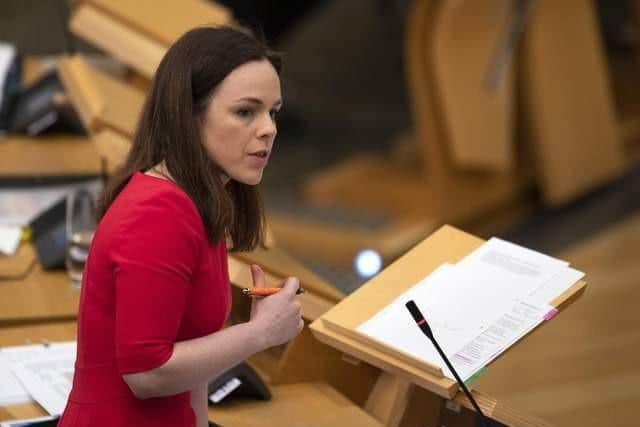Fears major infrastructure projects in Scotland face being cut back
Finance secretary Kate Forbes has warned it “will not be possible” for the Scottish Government to meet all of its commitments “within the funding available”.
She pointed to a shortfall of cash from the UK Government as well as high inflation, supply chain pressures and business disruption.
Advertisement
Hide AdAdvertisement
Hide AdA “targeted review” of capital spending, published last week, highlighted road improvement programmes as an area “where the funding profile has had to be slowed down”.


It is not clear which projects may be impacted. An updated “strategic transport projects review”, which will include indicative timescales, is set to be published later this year.
It came as Transport Scotland published its second delivery plan for Scotland’s national transport strategy, outlining four priorities – reducing inequalities, taking climate action, helping to deliver inclusive economic growth, and improving health and wellbeing.
It includes proposals to address landslips at the A83 Rest and Be Thankful, as well as further exploring options to “discourage car use”, including road user pricing.
The document states new road projects “will normally only be taken forward where they reduce the maintenance backlog, address road safety concerns or adapt the network to deal with the impacts of climate change or benefit communities".
Scottish Conservative transport spokesman Graham Simpson said: “The now-familiar war on motorists – driven by [the SNP’s] car-hating coalition partners, the Scottish Greens – is evident in plans to charge drivers for using their vehicles and the warning that new road projects will only get the green light in very limited circumstances.
“This short-sighted approach fails to recognise that for many people, particularly in remote areas of Scotland, cars are a necessity, not a luxury.”
Mr Simpson said any policy to reduce car usage “has to be accompanied by one making public transport more attractive and accessible”.
Advertisement
Hide AdAdvertisement
Hide AdElsewhere, Mr Simpson insisted “vital upgrades to Scotland’s key trunk roads have been kicked into the long grass time and again”.
He said: “The SNP must urgently clarify whether vital upgrades to key roads such the A75 to Cairnryan port, the A90 and 96 in the north-east, and the A9 between Perth and Inverness will now be delivered. And if not, explain why the safety of Scottish drivers is not a priority in their future spending.”
Labour MSP Daniel Johnson said: “With our rail services in disarray, further damage and delay to our transport infrastructure could prove disastrous for our economy.”
The capital spending review warns “challenging external market conditions of inflation and supply chain impacts” are already “causing delays and placing pressure on budgets associated with certain projects”.
The document adds: “Reflecting this, as well as the challenging fiscal position, within this targeted review of the 2021 capital spending review, there are a number of areas where the funding profile has had to be slowed down – such as road improvement programmes.”
Looking beyond 2026, the review said: “For a small number of major projects and programmes which span this and future spending review periods, due to the uncertainty about long term pricing and market conditions, funding is not able to be confirmed in full at this time.”
In a foreword to the document, Ms Forbes said: “Without a significant change in the position of the UK Government to release additional capital or to agree an increase in the Scottish Government’s borrowing capacity, alongside other UK Government actions such as the reduction or removal of VAT on energy and construction costs, it will not be possible to meet all of our commitments within the funding available.”
Professor Iain Docherty, Dean of the Institute of Advanced Studies at the University of Stirling, and Scotland's leading transport academic, said: “We know we don’t have as much money as we want and we know construction cost inflation is rampant.”
Advertisement
Hide AdAdvertisement
Hide AdHe added: “Obviously that will mean there will be fewer projects and some will get delayed, and therefore might not happen.”
A Scottish Government spokesman said: “The Scottish Government remains committed to improving road transport infrastructure throughout Scotland to improve road safety and bring economic benefits to users and local communities alike.
“We will continue to progress key road infrastructure commitments as set out in the original Capital Spending Review, with all spending as set out in the Scottish Budget 2022-23 confirmed. The Capital Spending Review differs from a detailed annual budget, project and programme level commitments will be outlined during the annual Budget process.”
Comments
Want to join the conversation? Please or to comment on this article.
